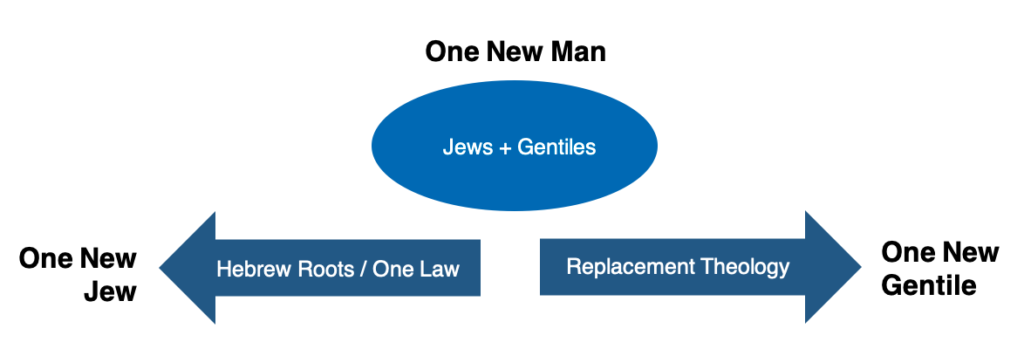I have been the director of Messianic Jewish Studies at The King’s University (TKU) since 2015, and I get the sense from my little corner of the universe that the Church is at a crossroads in understanding its relationship to Jews and Judaism. I keep meeting pastors and worship leaders and other devoted Christians who want to wade into these deep waters but find it difficult to know which directions are healthy and which lead to weirdness.
The aim of this article is to call us to work toward realizing Paul’s Ephesians 2 vision of the One New Man, made up of Jews and Gentiles in Messiah, who affirm each other as Jews and Gentiles. This is a healthy direction, and it leads to much partnership, fruitfulness, and peace in the kingdom of God. I also want to show how Hebrew Roots/One Law Theology and Replacement Theology represent departures from Paul’s One New Man vision—in opposite directions—with the former resulting in the One New Jew and the latter in the One New Gentile.

The King’s University Experience
From its beginning in 1997, The King’s University has been a trailblazer in its mission “to love, affirm, and stand with the Jewish people and Israel.” As a result, today we have a Center for Israel and Jewish Studies, a Messianic Jewish Studies program (undergraduate through doctoral level), a master’s degree with a concentration in Antisemitism and Jewish Advocacy, Land of the Bible concentrations, and a faculty, staff, and student body made up of Gentile Christians and Jewish believers. What makes The King’s University all the more fascinating is that this Jewish presence and focus is not something that runs parallel to the rest of the university; rather, Messianic Jews and Messianic Jewish studies are fully integrated into the life of the community even as Jews and Gentiles at TKU affirm each other in their respective identities and callings. Our Statement on the Church and the Jewish People puts it this way:
“We believe that the Church is a body of Jews and Gentiles in Messiah who are called to live out a God-given relationship of interdependence and mutual blessing (Rom 11:11-25; 15:7-27). At The King’s University, we celebrate this unity in diversity. Gentile believers do not need to become Jews or take on Jewish lifestyle to walk in the ways of the Lord (Acts 15). However, Jewish followers of Jesus are called to remain true to their identity as Jews (1 Cor 7:17-24; Acts 21:17-26).”
Given the centuries old parting of the ways between the Church and the synagogue, it is a miracle that we have a Christian university in our day where the faculty, staff, and student body is made up of Messiah-confessing Jews and Gentiles, who identify as Jews and Gentiles, and there is shalom bayit (peace in the house). As one who has participated in this learning community since 2015, I can testify that it is the real deal. Consider also that Jew-Gentile partnership is where the Church is heading. History is going in the direction of healing the schism between the Church and the Jewish people, and God forming his One New Man described in Ephesians 2. The King’s University is modeling something of eschatological importance (John 17:20-23), and we sense the leading of the Spirit and the goodness of the Lord in pioneering this Ephesians 2 approach to unity in the Church.
The Legacy of Jack Hayford and Gateway Church
I chronicle the history of how The King’s University became a learning community of Jesus-believing Jews and Gentiles in “The Story of TKU’s One New Man—To the Jew First Vision.” For those who want the two-minute version, however, it all goes back to the legacy of Pastor Jack Hayford and Gateway Church. For centuries, Gentile Christians have widely held that the Church—the One New Man—is composed of former Jews and former Gentiles. However, Pastor Jack, the late founder of The King’s University, contended that the One New Man reflects a continuing relationship of interdependence and mutual blessing between Jewish and Gentile believers in Jesus, the natural and grafted-in branches of the Romans 11 olive tree. He maintained that the Church is fully and authentically the One New Man only when it is made up of Jewish and Gentile followers of the Messiah who affirm each other in their respective identities. This means that Gentile Christian leaders should extend the right hand of fellowship to welcome Messianic Jews. As Pastor Jack wrote:
“…every effort should be bent toward helping the whole Body of Christ recognize, embrace, and receive Messianic Jews with understanding….”
Pastor Jack fervently maintained for half a century that unity in the Church and the global spread of the gospel would only be realized when we, like Peter in Acts 10-11, are awakened by the Holy Spirit to what God is doing today in forming his One New Man made up of Jews and Gentiles in Messiah, who remain in their respective callings. Pastor Jack gives the charge, “If any one of us—but better, each one of us—will open [up] to the Lord’s purpose to give rise to [the] One New Man, revival will spread and Messiah Jesus will be glorified through His Church.”
Similarly, Gateway Church has instilled in The King’s University a vision for the gospel being “to the Jew first,” as Paul says in Romans 1:16. For Gateway Church, To the Jew First is not only a principle of God’s order for sharing the gospel but it also has implications for how we read the Bible. PA representative described his own journey in this regard:
“I was taught replacement theology in Bible college [the idea that the Church has replaced the Jewish people as the people of God] and I didn’t know any different. It wasn’t until Wayne Wilks at Shady Grove Church, in an elders meeting, began to take us Scripture by Scripture to show us that God still had a place in His heart, and a plan, for the nation of Israel. Once you see it in Scripture, it changes everything. Just a while back I was with one of the largest churches in the world and the senior pastor said to me, ‘What’s the most important thing you can share with us?’ I just immediately said, ‘Take the gospel to the Jew first: Romans 1:16.’”
Continue reading “One New Man, Hebrew Roots, Replacement Theology.”

